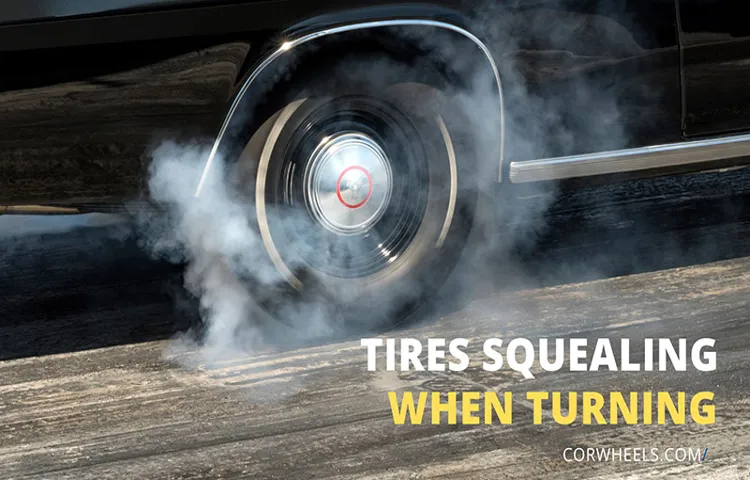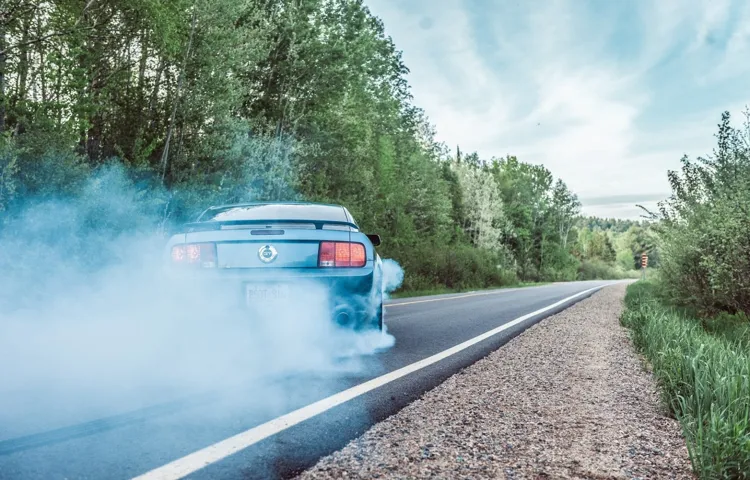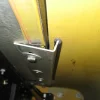Tires are an essential component of your vehicle, and when you hear any strange noise coming from them, it may cause concern. One of the most common noises that car owners experience is a tire squealing when accelerating. It’s not only irritating but can also be an indicator of potential issues with your car.
But what causes tire squealing, and how serious is it? Is there a need to head to a mechanic, or is it just a minor inconvenience? In this blog, we’ll discuss the possible causes behind tire squealing when accelerating and what steps you can take to address it. So, buckle up and let’s dig into it!
Table of Contents
Insufficient Tire Traction
Have you ever pressed the gas pedal and heard your tires squeal? This sound is an indicator that your tires are not providing enough traction. It can be caused by a few different factors. Firstly, the road may be wet or covered in debris, making it more difficult for your tires to grip the ground.
Another factor could be the type of tire you have. If your tires are old or have low tread, they will struggle to grip the road surface. Lastly, the power of your vehicle could be overpowering your tires, causing them to skid and slip.
If you experience tire squealing when accelerating, it’s important to address the issue promptly. Ensure your tires are properly inflated and have sufficient tread depth. If necessary, consider upgrading to high-performance tires that have better traction.
This will not only improve your driving experience but also keep you safe on the road.
Worn Tires
Worn Tires When it comes to driving, having sufficient tire traction is paramount to ensuring a safe and smooth ride. However, worn tires can greatly diminish the amount of traction that your car can generate, which can put you and your passengers in danger. Worn tires have a reduced amount of tread, which is the part of the tire that contacts the road, thereby reducing the surface area in contact with the pavement.
This reduced surface area equates to less grip, and therefore less traction, which can make it difficult to control your vehicle, especially in wet or icy conditions. Additionally, worn tires are more susceptible to blowouts and punctures, which can lead to sudden and unexpected tire failure. Ensure that your tires are in good condition by regularly inspecting them for wear and damage, and replace them as necessary to avoid a loss of traction on the road.

Incorrect Tire Pressure
Incorrect Tire Pressure can significantly impact your vehicle’s performance, especially regarding tire traction. If your tires are underinflated or overinflated, they won’t have the correct contact with the road, leading to reduced friction and poor traction. This scenario can be particularly dangerous during rainy or snowy conditions, as the tires won’t grip the road correctly.
Underinflated tires are more prone to slip, while overinflated tires can cause uneven wear and reduced grip. Therefore, it’s vital to ensure that your tires have the recommended pressure level to maintain proper tire traction, increasing your safety while driving. Remember to check your vehicle manufacturer’s recommendations for tire pressure levels and to check your tire pressure regularly.
It’s a simple yet effective way to ensure your tires are performing optimally and keeping you safe on the road.
Wrong Tire Size
If you’re experiencing insufficient tire traction, the root of your problem may be the tire size. If your tires aren’t the right size, it can lead to a host of issues. For instance, if your tires are too small for your vehicle, your car won’t handle correctly and won’t grip the road as it should.
Alternatively, if your tires are too big, it may lead to increased friction and drag, making your car work harder, which can result in reduced gas mileage and increased wear and tear on your vehicle. In either situation, you could be putting yourself in danger, especially in adverse weather conditions such as rain or snow. So, if you are unsure about the size of tire for your vehicle, consult your user manual or consult with a professional tire technician at your local shop.
Paying attention to the right tire size will help you avoid such scenarios and ensure your safety on the road.
Mechanical Issues
If you’ve noticed tire squealing when accelerating, it could be a sign of mechanical issues with your car. This can be caused by a variety of factors, including worn-out tires, loose belts, and improperly aligned wheels. Tires that have worn out or have a low tread depth can cause the squealing noise since they don’t grip the road as well as they should.
Loose belts may also cause the noise as they slip out of place, and wheels that aren’t aligned cause uneven tire wear leading to a change in the size of the tires. If you notice this noise, it’s best to have a mechanic inspect your car to determine the exact cause and make repairs as necessary. Don’t ignore this noise, as it could indicate serious mechanical problems that pose a safety hazard, especially when driving at high speeds.
Worn Brake Pads or Rotors
Worn brake pads or rotors are a common mechanical issue that can cause major problems for your vehicle. Brake pads are the part of the braking system that create friction with the rotors, slowing your vehicle down and bringing it to a stop. Over time, these pads can become worn down, reducing their effectiveness and increasing the amount of time it takes for your vehicle to come to a stop.
Worn brake pads can also cause damage to your rotors, which can lead to costly repairs. If you notice any squealing or grinding noises when you hit the brakes, or if you feel a vibration in your steering wheel or brake pedal, it’s important to have your brakes checked by a professional. Regular maintenance and inspection of your brake system can help prevent more serious problems down the road, and ensure that your vehicle is safe to drive.
Don’t let worn brake pads or rotors put you and your passengers at risk. Take care of your braking system and stay safe on the road.
Damaged Wheel Bearings
Damaged wheel bearings can cause a multitude of issues, including strange noises or vibrations while driving, decreased fuel efficiency, and even dangerous accidents. These mechanical components are responsible for facilitating the smooth rotation of your car’s wheels, and when they become damaged, it can lead to a host of problems. Some common signs of damaged wheel bearings include a humming or grinding noise coming from the wheels, a vibrating sensation in the steering wheel, and uneven tire wear.
If you suspect that your wheel bearings may be damaged, it’s important to have them inspected by a mechanic as soon as possible to avoid any potential safety hazards. In addition to ensuring your own safety, addressing wheel bearing issues promptly can also help prevent unnecessary damage to your vehicle’s tires and suspension system. So, if you notice any unusual noises or vibrations while driving, don’t hesitate to have your wheel bearings checked out by a professional.
Worn Suspension Components
If you notice your vehicle is handling poorly or making strange noises when you hit bumps in the road, you may have worn suspension components. These could include anything from worn-out shocks to damaged control arms or bushings. Over time, these parts can wear down due to normal use or rough terrain, and this can cause your car to become unsafe to drive.
It’s important to get these parts replaced as soon as possible to avoid further damage to your vehicle and to ensure your safety while on the road. If you’re unsure if your suspension components are worn, take your car to a mechanic who can diagnose the issue. They can also recommend the best parts to use for the repair.
Don’t put off fixing your suspension components, as it could lead to more costly and dangerous issues in the future. Keep yourself safe and get your car running smoothly again.
Driving Habits that Cause Tire Squealing
Have you ever accelerated quickly from a stoplight and heard your tires squeal? This may be due to your driving habits. One common mistake is applying too much pressure to the gas pedal when starting off. This causes the tires to lose traction and squeal.
Another habit that can cause tire squealing is taking corners too quickly. When you turn a corner too fast, the tires lose grip on the road and squeal as they slide sideways. Finally, if you have worn tires, they may be more prone to squealing.
It is important to maintain your tires properly and replace them when necessary to prevent excessive noise. By being aware of these driving habits and making small changes to your driving style, you can reduce tire squealing and improve your overall driving experience.
Aggressive Acceleration
Aggressive acceleration can not only be dangerous for you and other drivers around you, but it can also cause damage to your tires. When you abruptly press down on the gas pedal, you put a lot of stress on your tires, causing them to squeal. This can wear down your tires faster and decrease their lifespan significantly.
To avoid this, it’s important to accelerate gradually and smoothly. Not only will this make your driving safer, but it will also help your tires last longer and save you money in the long run. So next time you hit the road, take it easy on that gas pedal and give your tires a break.
Hard Braking
Hard braking is one of the most common driving habits that lead to tire squealing. This can happen when the driver applies the brakes suddenly and forcefully, causing the tires to lose traction and skid. Hard braking not only leads to tire wear but can also result in reduced fuel efficiency.
When you brake suddenly and apply immense force on the brakes, it causes the tire surface to wear out quickly, leading to premature tire failure. Furthermore, this habit can cause the brake pads to overheat and wear out faster, leading to expensive repairs. Using an analogy, imagine slamming on the brakes as if you were trying to stop a runaway train.
This would be similar to what your car’s tires feel when you practice hard braking. Therefore, to avoid tire squealing and shorten the lifespan of your tires, it’s essential to apply the brakes steadily and smoothly and avoid sudden stops. By doing so, you’ll also improve your fuel economy and keep your braking system working efficiently.
Conclusion and Recommendations
In conclusion, the sound of tire squealing when accelerating is nature’s way of telling us that we’re living life a little too vibrantly. It’s a reminder that we need to slow down and enjoy the ride a little more smoothly. So, instead of feeling embarrassed by the screech of your tires, embrace it as a playful reminder to never take life too seriously.
After all, what’s the point of having a high-performance car if you can’t have a little fun along the way?”
FAQs
Why is my car’s tire squealing when I accelerate?
The tire squealing when accelerating can be caused by several factors, such as lack of tire traction, worn out tires, or a damaged transmission or differential.
Can low tire pressure cause tire squealing?
Yes, low tire pressure can cause the tire to wear unevenly and produce a squealing noise when accelerating.
How can I determine if my tires are worn out?
You can check the tire tread depth with a tread depth gauge or by using the penny test. Insert the penny into the tread groove with Lincoln’s head upside down. If you can see all of Lincoln’s head, then it is time to replace your tires.
Why is my car pulling to one side while accelerating?
This could be due to an alignment issue, worn-out suspension parts, or low air pressure in one of the tires.
Is it dangerous to drive with a squealing tire?
Yes, it can be dangerous as it indicates that something is wrong with your car, and it could lead to a loss of control while driving.
How often should I check my tire pressure?
It is recommended to check your tire pressure at least once a month, or before going on a long road trip.
What should I do if my tire is damaged?
If your tire is damaged, you should get it repaired or replaced immediately to prevent a blowout while driving.



